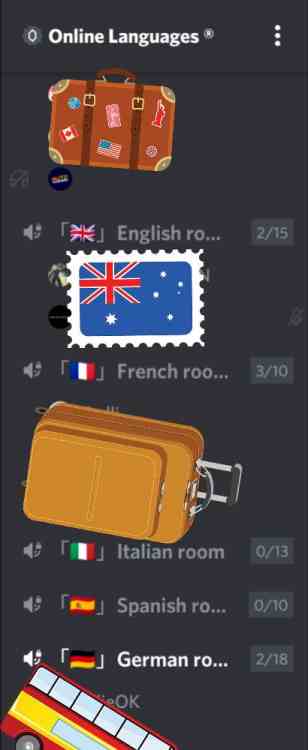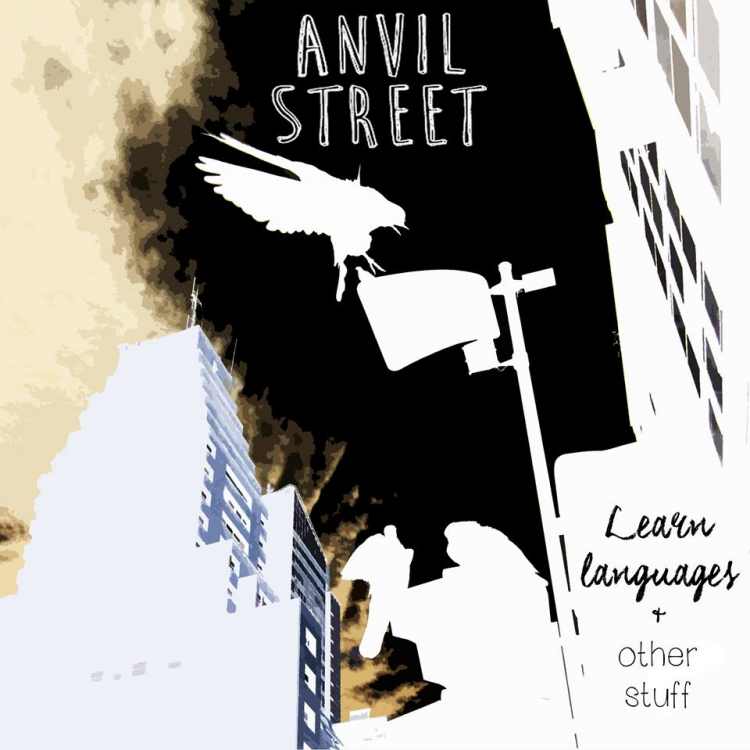Search the Community
Showing results for tags 'culture'.
-
Online Languages ® Discord is a dedicated server hosting interactive language-related activities: learning, teaching, studying, translating and exchanging. We Offer: English, French, Arabic, Turkish, Portuguese, Italian, Hindi, Russian, Spanish, German, Dutch, Polish, Chinese and much more.. Hope you enjoy being a part of our highly active community! To join us you should follow these steps : 1-You should install discord from the play store. 2-Then you sign up on discord . 3-You will find symbol + with green color in the left side you click on that and you choose the last option 'join the a server. then you paste the link ⬇️ https://discord.gg/5TA3BGUuGR
-
- polyglot
- french
-
(and 27 more)
Tagged with:
- polyglot
- french
- language learning
- learn
- languages
- japanese discord
- spanish
- help
- español
- arabic discord
- turkish discord
- lesson
- culture
- voice call discord
- indonesian discord
- international discord
- discord server
- server
- korean discord
- practice
- learning app
- portuguese
- discord
- learn english
- study
- multilingual
- friends
- learning
- community
-
Live Lingua offers online classes via Skype with native, experienced and certified teachers in 11 of the most commonly spoken languages worldwide: Arabic, Chinese, English, French, German, Japanese, Korean, Portuguese, Russian and Spanish. Unlike other online language schools, Live Lingua offers the services of highly qualified professionals, who go through a thorough selection and training procedure to be part of our teaching community. Unlike brick and mortar schools, Live Lingua does not require you to move around or adjust your schedule. With the obstacle of inconvenience being eliminated, it becomes much easier to achieve your goal of learning a language. To make it even easier for you to cross the threshold, you can sign up for a free trial class at http://www.livelingua.com
-
What about having french courses in a tropical island, in the warm Indian Ocean ? You can choose to attend Group course or Private Course or a Combination of both of them. It's up to you ! After school you can discover the marvels of our amazing Reunion Island. Make new friends and enjoy our suggestion-of-activities planning ! You won't forget the taste of the reunionese dishes, the colorful culture, the magnificent intensity of the tropical, coastal, montaineous landscape ! We guarantee high quality courses : the group are up to 8 students max., and are conversation-oriented. The Private lessons face to face with a teacher are personalized and designed to improve where the student has difficulties. Most of our students are staying in one of our carefully selected host families : the best way to make the most of the language stay and intensify the french practice after school. If you want to discover what’s going on at our school at the moment, feel free to like and follow our Facebook page : Learn French on Reunion Island - DP LANGUES Reunion ! You can also have a look at our website DP Langues - School of Language. We have an Online French Test that can you do at any time ! Looking forward to hearing from you soon ! With tropical regards, DP Langues Team
-
Looking for French Courses ? Come to Reunion Island, at DP LANGUES school of language ! What about having french courses in a tropical island, in the warm Indian Ocean ? You can choose to attend Group course or Private Course or a Combination of both of them. It's up to you ! After school you can discover the marvels of our amazing Reunion Island. Make new friends and enjoy our suggestion-of-activities planning ! You won't forget the taste of the reunionese dishes, the colorful culture, the magnificent intensity of the tropical, coastal, montaineous landscape ! We guarantee high quality courses : the group are up to 8 students max., and are conversation-oriented. The Private lessons face to face with a teacher are personalized and designed to improve where the student has difficulties. Most of our students are staying in one of our carefully selected host families : the best way to make the most of the language stay and intensify the french practice after school. If you want to discover what’s going on at our school at the moment, feel free to like and follow our Facebook page : Learn French on Reunion Island - DP LANGUES Reunion ! You can also have a look at our website dplangues.com. We have an Online French Test that can you do at any time ! Looking forward to hearing from you soon ! With tropical regards, DP Langues Team
-
What's a better way to learn a language without learning its culture? At http://wanderlustlearn.com/, we help you to learn German in a fun and interesting way ! Check it out!
-
Culture: The Cities of Ashes Part 3: Pompeii & Heculaneum - The Cities That Vanished It is August 24, 79 AD. People of Pompeii and Herculaneum are doing their usual routine. The rich are coming to Pompeii, this major resort city and port. It is busy and bustling, with traders from everywhere and people visiting the temples of Venus, Jupiter and Apollo, all of which are near the forum. The land is rich and the area is known for its grapes and olive trees. There were several smaller earth tremors in the previous few days, but nothing alarming. Just yesterday, there was a great celebration in the name of Vulcan. And then, the disaster strikes. ___________________________ Mount Vesuvius had erupted and the two cities were buried under 20 feet of ash and debris in the matter of just a few days. It is estimated that about 16000 people died. The pyroclastic surge had been devastating. Unlike Pompeii, the deep pyroclastic material which covered Herculaneum preserved many objects which were based on organic material, primarily roofs, beds, doors and food. It goes without saying that the same was for some 300 skeletons which had been found in the city. Since Herculaneum lay to the west of Vesuvius, unlike Pompeii, which was in the direct path, it was only mildly affected by the first phase of the eruption. This was not the case with Pompeii where the roofs collapsed under the weight of falling debris and ash. The recent studies have shown that the lethal effects of the pyroclastic surges were primarily due to the heat. The heat was the main cause of the death of people not suffocation. The people were dead long before the ash even touched them. They were dead the moment that the wave of heat enveloped the city. The city of Pompeii continues to attract visitors due to its unusually cruel fate. It is ironic that prior to the eruption of a volcano, just a day before in fact, the people of Ancient Rome were celebrating Vulcan, the god of fire. What a twist of fate indeed!
-
- culture
- ancient rome
- (and 7 more)
-
Culture: Mythology Themes - Gods in Ancient Rome Part 2: The Cult of Mithras When I was studying the history of Ancient Britain, I found it curious that there was a cult of Mithras which had been brought to Britain sometime in the late Pre-Christian era. The Romans were responsible for this new exotic cult. I say exotic because Mithras is a Persian deity and it is curious that he also appears in Roman mythology. Here are some interesting facts about it: Mithras as a Roman deity appeared somewhere in the Anno Domini era, from 1st century to 4th century, when it completely disappeared. Though there are few mythological sources about it, there are many depictions in caves. They mostly illustrate Mithras as a “bull-slayer.” In antiquity, the text usually refer to the “mysteries of Mithras” and it is often linked with the Persian deity. Many do not believe this, but we still have to note that sometimes Mithras appears with another figure, a mysterious lion-headed figure, who may have been the Arimanius (Avestan god of Zoroastrism, the evil spirit) himself. The temples for Mithras were often built in caves (this is why the depictions are found in caves as well). These underground temples have been built in the 1st century AD when the cult of Mithras is believed to have appeared in Ancient Rome. This cult, though not very long lasting, was still influential, considering that it had gone as far as Ancient Britain (which was, at that point in history, a part of the Roman empire). This is why it should be mentioned, considering that it is a part of the Ancient Roman pantheon.
-
Culture: Mythology Themes - Gods in Ancient Rome Part 1: Basic Outline & Dii Consentes It is important to mention that Ancient Romans were polytheists, i.e. they believed in many gods. In the beginning, these Roman gods were considered as faceless and extremely powerful. It is only later on that they became anthropomorphised beings, i.e. Ancient Romans started imagining them as humans. These beliefs primarily came from Ancient Greece. This is also why many of Roman gods have their corresponding Greek counterpart. The entire collection of all these gods is called Pantheon. Although there are far too many gods to be listed, we still have to note the magnificent twelve: the twelve great gods and goddesses also known as “Dii Consentes” (this is the name that Varro gave to these deities) whose statues stand in the Forum. There are six gods and six goddesses, namely: Roman Greek Apollo Apollo Ceres Demeter Diana Artemis Juno Hera Jupiter Zeus Mars Ares Mercury Hermes Minerva Athena Neptune Poseidon Venus Aphrodite Vesta Hestia Vulcan Hephaestus Other notable gods are: Roman Greek Bacchus Dionysus Cupid Eros Pluto Hades Proserpina Persephone Saturn Cronus You will note that many of these Roman gods are actually the names of the planets. This is because our culture had always had access to the Roman culture. However, this was unfortunately not the case with the Greek culture, primarily because of the alphabet. Thus, for many years, the influence of the Greek culture could only be felt through Latin translations of Greek works.
-
- greek gods
- culture
-
(and 6 more)
Tagged with:
-
Hi there! As I said in my introduction, I would like to introduce my two blogs to you. This time I will introduce my blog about Spanish language and culture. I write from time to time on it. I like to see it growing up with new posts, while sharing some Spanish culture and travelling experiences. Its name is "Everyday Spanish!". It is about Spanish culture and language. I am writing it in English, and it also has posts about other topics related to Spanish culture like music or videos. The website is http://everyday-spanish.blogspot.com . You are welcome! I will be glad to see you there. Finally, just in case you have not read my introduction, you can find a link to it below: Thank you for reading and hope you have a great weekend ahead! See you around! Oscar
-
http://anvilstreet.net/ was designed to share pictures, articles and videos so you can practice English, Spanish and French, and learn about other cultures at the same time. Anvil Street a été conçu pour partager des photos, articles et vidéos pour que vous puissiez pratiquer le français, l'anglais et l'espagnol en découvrant d'autres cultures. Anvil Street fue diseñado para compartir fotos, artículos y vídeos para que puedan practicar el español, francés e inglés, y descubrir otras culturas al mismo tiempo.
-
I wonder if native speakers can really feel the beauty of their own language. Can they be objective when they discuss its grammar and vocabulary? Are they the best judges for what's "the best" and '"the worst" in their culture? I'm a native Russian speaker and I've met people who really enjoyed studying Russian. But I could never really understand them. I cannot look at my native language from the point of view of someone who's only just discovering it. Also, when it comes to giving advice about the cultural bits, my point of view will be heavily influenced by what I've learnt while growing up, by what's acceptable or not in Russian society, by my political views etc. Now that I live in Poland, I feel the same "cloud" covering my eyes when it comes to Polish. I remember how it looked to me when it was still "foreign" and how now I take it for granted. I'm no longer a very good judge of just how difficult or easy a certain grammar issue may be. What's your opinion about native vs non-native speakers? Who is more objective? Who's more likely to give you good insights and recommendations?











